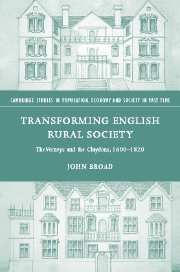Book contents
- Frontmatter
- Contents
- List of figures
- List of tables
- Preface
- Acknowledgements
- Note on editorial practice
- List of abbreviations
- 1 Introduction
- Part I Re-establishing a gentry family 1600–1657
- 2 A gentry family in county and court society 1603–1642
- 3 The Civil War and Interregnum 1642–1657
- 4 The creation of an enclosed estate 1600–1657
- Part II The shaping of family and village 1657–1740
- Part III The great estate and estate communities c. 1700–1820
- Appendix A Sir Ralph Verney's confessional letter of 1650
- Appendix B The genealogy of the Verney family
- Bibliography
- Index
3 - The Civil War and Interregnum 1642–1657
Published online by Cambridge University Press: 03 July 2009
- Frontmatter
- Contents
- List of figures
- List of tables
- Preface
- Acknowledgements
- Note on editorial practice
- List of abbreviations
- 1 Introduction
- Part I Re-establishing a gentry family 1600–1657
- 2 A gentry family in county and court society 1603–1642
- 3 The Civil War and Interregnum 1642–1657
- 4 The creation of an enclosed estate 1600–1657
- Part II The shaping of family and village 1657–1740
- Part III The great estate and estate communities c. 1700–1820
- Appendix A Sir Ralph Verney's confessional letter of 1650
- Appendix B The genealogy of the Verney family
- Bibliography
- Index
Summary
The English Civil War was a time of crisis and tragedy for the Verney family. The persons and story are well known and widely quoted from the Verney memoirs. Sir Ralph Verney lost his father, mother, and grandmother in 1641 and 1642. During the 1640s he exiled himself in France because of his principled stand against a religious oath in parliament. Living in relative poverty, he lost two of his children before his wife died from breast cancer. He was separated from his younger son John for long periods, while his brothers and sisters, all in their teens and twenties, needed his guidance, influence, and money to sustain them. He saw one brother die in battle and four of his sisters marry in difficult circumstances. Yet by no means all the family problems can be laid at the door of civil commotion, and this chapter attempts to disentangle some of the parallel strands whose coincidence made it a difficult time.
The Civil War had a considerable impact on the landed classes in English society. Land was subject to very considerable increases in taxation, despite the introduction of excise duties on a variety of everyday goods. Although the first Civil War lasted only from 1642 to 1646, high taxation lasted much longer, and was compounded in many areas by the continuing cost of quartering parliament's large army. These effects were national but uneven, with taxes pressing harder on southern than northern England.
- Type
- Chapter
- Information
- Transforming English Rural SocietyThe Verneys and the Claydons, 1600–1820, pp. 27 - 47Publisher: Cambridge University PressPrint publication year: 2004

